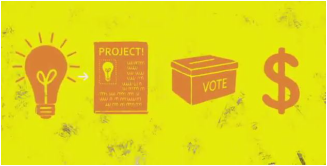 These steps for participatory budgeting can improve democracy. These steps for participatory budgeting can improve democracy.
Tags: government/the state, politics/elections/voting, budgeting, democracy, real utopia, 00 to 05 mins
Year: 2013 Length: 3:02 Access: YouTube Summary: This video from the Participatory Budgeting Project provides an overview of participatory budgeting (PB). In short, it is a "a different way to engage with government and decide how tax dollars are spent" by engaging all citizens in the budgeting process. The video outlines the steps of participatory budgeting, including (1) brainstorming ideas for projects that citizens would like to see in their neighborhoods; (2) having volunteers develop project proposals and narrow down the proposals; (3), presenting projects to the public for a vote; and (4) funding the projects with the most votes. The projects are then implemented and the process starts again the next year and budgeting cycle. The video draws upon testimonies from people who participate in the New York City PB process (the largest PB system in the US), noting the project's success. It further adds that the process started in Porto Alegre, Brazil in 1989 and has spread throughout 1,500+ communities around the world. Porto Alegre is the most famous example, and has been studied widely. For example, it is featured in Erik Olin Wright's Real Utopias project (see chapter 6, pages 155-167). Wright describes the project and its impacts on Porto Alegre, including a shift toward greater spending on poor communities, high and sustained levels of participation, strengthening of civil society, the near elimination of corruption, and greater tax compliance. Submitted By: Paul Dean
3 Comments
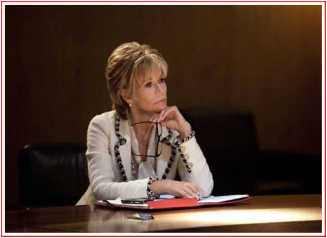 Power and money can shape what gets disseminated as "news". Power and money can shape what gets disseminated as "news". Tags: art/music, media, politics/election/voting, big business, censorship, ideology, political inequality, power, 06 to 10 mins Year: 2012 Length: 6:58 Access: YouTube Summary: This scene from the HBO series The Newsroom effectively captures how people in high-ranking institutional positions may exercise their incredibly great power. The clip illustrates how raw power serving vested interests can affect what is communicated to the masses as news. In this case, the owner of the media corporation (Leona played by Jane Fonda) is demanding that news division president, Charlie (Sam Waterston), straighten out the lead anchor, Will (played by Jeff Daniels), because of Will's efforts to report how big business has taken over the Tea Party. She specifically threatens to fire Will if he continues to follow the story. Art often imitates life, and notice that Leona references the Koch brothers in her tirade, and indeed they were targets of Will in this episode and another during 2012 (see this Wall Street Journal piece for criticism of the show's "Koch-kicking," and this AFL-CIO story for an opposite take). Also see how life imitates art as evident in this Salon.com article detailing the Koch brothers' efforts to censor public television programming. (Plans to produce a full-length documentary, Citizen Corp, which in part critically examined their political activities, were scrapped after the brothers threatened to withhold major funding from PBS. Nevertheless, the filmmakers were still able to raise enough money to complete the film, and then distribute it as Citizen Koch through theaters.) (Note: A version of this post originally appeared on SoUnequal.) Submitted By: Rene Gonzalez 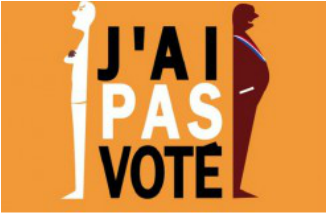 Why do people choose not to vote and what are the consequences? Why do people choose not to vote and what are the consequences? Tags: politics/elections/voting, democracy, france, subtitles/CC, 21 to 60 mins Year: 2014 Length: 46:23 Access: YouTube Summary: The french film "I didn't vote" (J'ai pas voté), which features subtitles in several languages, assesses the current political crisis and discusses effective solutions. The documentary offers an analysis of politics in general, and especially questions the meaning of elections. It addresses topics such as why people chose not to vote, the relationship between money and politics, similarities and differences across political parties in France, dynamics of political campaigns, the origins of democracy, and the French Revolution. "I didn't vote" is a film which examines French democracy in order to open up a new era to encourage the development of political democracy. Submitted By: Jaipasvote 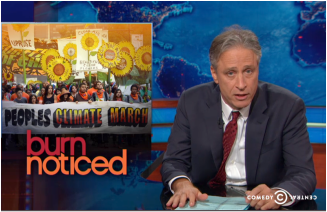 Political agendas enter into scientific discourse. Political agendas enter into scientific discourse. Tags: corporations, environment, government/the state, politics/election/voting, science/technology, campaign financing, climate change, global warming, house of representatives, political bias, 06 to 10 mins Year: 2014 Length: 10:25 Access: The Daily Show Summary: This segment from The Daily Show spotlights a recent hearing of the U.S. House Committee on Science, Space, and Technology, in which President Obama's plan to decrease carbon emissions by 30% by 2030 was discussed. The video would be useful for explaining political bias, the relationship between wealth and power, and the power of corporations in elections. The clip includes footage from the hearing, in which several politicians interrogate Presidential Science Advisor John Holdren about whether climate change is a reality, despite the fact that, by now, the scientific literature has overwhelmingly shown that climate change is a massive global threat for humanity. In this video, U.S. Representatives Steve Stockman (R-Texas) and Larry Bucshon (Indiana-R) refute global warming, despite their inability to provide viable evidence. Indeed, Congressman Bucshon argues that people should trust public comments rather than scientific literature because, in his opinion, “The climatologists...depend on the climate changing to keep themselves publishing articles." He concludes that, "I could read that, but I don’t believe it.” At the end of the clip, Jon Stewart points to Stockman's interest in denying climate change, revealing that his three major campaign donors are big energy companies. This video would work well in combination with another clip on The Sociological Cinema, which illustrates how, despite overwhelming scientific evidence, powerful interests are able to suppress knowledge by introducing doubt into public discourse. Submitted By: Nihal Çelik 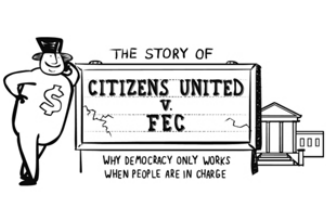 Citizens United v. FEC's impact on US democracy Citizens United v. FEC's impact on US democracy Tags: capitalism, corporations, crime/law/deviance, government/the state, politics/election/voting, campaign financing, citizens united v. federal election commission, democracy, power elite, supreme court, 06 to 10 mins Year: 2014 Length: 8:50 Access: YouTube Summary: This short video created by The Story of Stuff Project explores the relationship between wealth and political power, and examines whether we can speak of democratic elections in the United States. As the video points out, Americans have lost power in their democracy because of modern corporations' single-minded focus on maximizing profits, which have rapidly grown. Although the government can, and should, intervene by setting ground rules to protect society and keep things safe and fair, the reality of the current situation is that corporations, rather than people, write the rules. With Citizens United v. Federal Election Commission (FEC) in 2010, the Supreme Court decided that it is unconstitutional to put any limit on corporations’ financial contribution to elections because it violates free speech (this also invalidated part of the McCain-Feingold Campaign Finance Reform Law). As a result of this decision, corporations can now spend unlimited sums to help elect or defeat political candidates, which makes campaign financing undemocratic. The total cost of elections (congregational and presidential) almost doubled after Citizens United v. FEC, growing from $3.6 billion in 2010 to $6.2 billion in 2012. As the video highlights, the First Amendment was written to protect real people, not corporations. How can people be in charge of democracy again? First, there is a need for a constitutional change, which would overturn the Supreme Court's decision by establishing that corporations do not have the same First Amendment rights as people. Second, in order to eliminate the power of corporations in manipulating the elections, public financing of campaigns needs to be regulated, not liberated. Finally, given that 85% of Americans feel that corporations have too much power and individuals have too little, people should speak up and take social action by fighting for the things people (and not corporations) care about, such as renewable energy, green jobs, health care, safe products, and good-quality education. Submitted By: Nihal Çelik 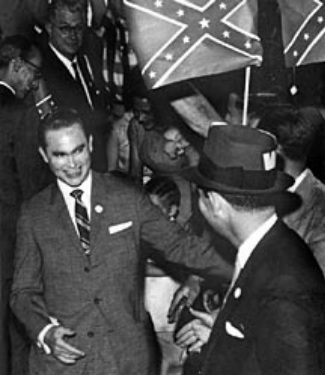 George Wallace, pro-segregationist Alabama Governor. George Wallace, pro-segregationist Alabama Governor. Tags: class, politics/election/voting, prejudice/discrimination, race/ethnicity, American South, desegregation, george wallace, political parties, race relations, segregation, 61+ mins Year: 2000 Length: 172:35 Access: YouTube (part 1; part 2) Summary: This three-hour PBS special documentary, titled George Wallace: Settin' the Woods on Fire, chronicles the life and career of Alabama Governor, George Wallace, well known for being the leader of pro-segregation policies during the 1960s. However, before his election as governor, he first ran for office in the 1950s and was considered a moderate who spoke against the Klu Klux Klan. In this election, Wallace's focus was on economic inequality instead of race relations, and he was endorsed by the National Association for the Advancement of Colored People (NAACP). This focus resulted in Wallace's loss to opponent John Patterson. The film goes on to document Wallace's transition into a leader of segregation throughout Alabama and the United States. The film's website offers additional educational resources, including a timeline of his life and political career, election maps, relevant people and events, and a teacher's guide. Additional resources, including transcripts, primary source documents, and a list of suggested reading, are also available on the film's website. George Wallace: Settin' the Woods on Fire won the Sundance 2000 Film Festival Special Jury Prize. Submitted By: Anonymous 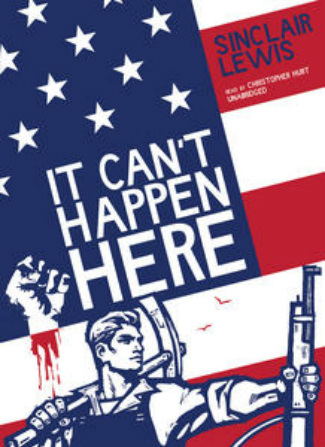 Film explores whether the US is immune to tyrannical rule. Film explores whether the US is immune to tyrannical rule. Tags: crime/law/deviance, government/the state, historical sociology, inequality, nationalism, politics/election/voting, dictatorship, domination, oligarchy, social construction of reality, tyranny, 61+ mins Year: 2013 Length: 94:23 Access: Top Documentary Films Summary: As stated on the film's website: "There are many perfect examples in our recent history which undoubtedly show that dictatorial regimes impose subjection, blackmail, servitude, intimidation, abuse, persecution and execution upon innocent people. However, many Americans are strongly convinced and assuredly assert that such a thing could never happen in the United States. But is this just desirous reasoning? Or, is there something essentially disparate about the United States that makes it resistant to the despotic abuse that has afflicted every other considerable empire in history? The primary step in scrutinizing the assertion that it can't happen here is to recognize and describe what "IT" is. Many people have distorted, almost comic-book-type, impression of dictatorship. In the real world autocracy has always crept in under the pretense of safeguarding the nation, defending the people, and establishing law and order. A dictator, in order to acquire and hold power, must demand the support of the people. An effective oppressor cannot publicly display malevolence and desire for power but must design his approach so as to persuade the people that his goals are righteous, that he wants honesty and fairness to abound, and that the most desirable way to make that true is to give him or her dominance and authority. Tyrannical governments develop by abusing people's fears - economic uncertainty, crime, foreign aggressors and so on and persuading the people that the quick-fix is for a political leader to be legally given absolute jurisdiction so he can shield the people from the wickedness of the world. This is always the pattern out of which autocracy is born. No matter how cruel or bloodthirsty regime becomes those in charge will persist to claim noble intentions and will dictate that an extreme government powers are required to protect the people and to create justice and order. Every time mankind has taken a step away from democracy and towards autocracy it was done in the name of defending the country and the people." Submitted By: Tom Sparhawk 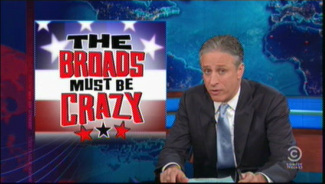 Jon Stewart points out the sexism endured by women in politics Jon Stewart points out the sexism endured by women in politics Tags: emotion/desire, gender, politics/election/voting, prejudice/discrimination, leadership, subtitles/CC, 06 to 10 mins Year: 2014 Length: 10:52 Access: The Daily Show: Part 1, Part 2 Summary: Men and women are often judged in opposite ways even when engaging in nearly identical behaviors, and authors such as Kathleen Hall Jamieson point out how these social judgments are especially problematic for women in leadership positions, as masculine authority supposedly contradicts feminine social expectations. This contradiction and the social judgments of men and women is highlighted in a recent segment from The Daily Show, titled "The Broads Must be Crazy." Jon Stewart first points out that the speculation about whether Hillary Clinton’s recently ascribed grandmother status will affect her electability has “never, ever” been an issue with any grandfather candidate who has sought the presidency. The segment then outlines numerous instances where male and female politicians were framed in entirely different ways when engaging in similar, if not identical, behaviors. The end of the clip even illustrates how the supposedly feminine emotions are thought to be strengths when expressed by men; while a nearly identical emotive expression is seen as problematic for female leaders. Submitted By: Jason T. Eastman 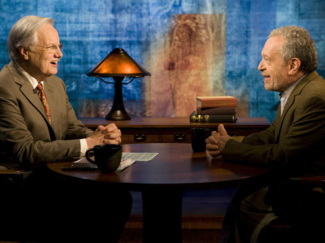 Robert Reich discusses economic inequality with Bill Moyers Robert Reich discusses economic inequality with Bill Moyers Tags: capitalism, class, consumption/consumerism, corporations, crime/law/deviance, economic sociology, globalization, government/the state, inequality, organizations/occupations/work, political economy, politics/election/voting, science/technology, robert reich, social mobility, subtitles/CC, 21 to 60 mins Year: 2013 Length: 56:46 Access: Moyers & Company Summary: In this interview on Moyers & Company, former Secretary of Labor and professor of public policy at the University of California in Berkeley, Robert Reich discusses economic inequality and the worrisome connection between money and political power. Reich notes that "Of all developed nations, the US has the most unequal distribution of income," but US society has not always been so unequal. At about the 6:20 mark, the clip features an animated scene from Reich's upcoming documentary, Inequality for All, which illustrates that in 1978 an average male worker could expect to earn $48,302, while an average person in the top 1% earned $393,682. By 2010, however, an average worker was only earning $33,751, while the average person in the top 1% earned $1,101,089. Wealth disparities have also been growing, and here Reich explains that the richest 400 Americans now have more wealth than the bottom 150 million Americans. What happened in the late 1970s to account for the current trend of widening inequality? According to Reich, there are four culprits. First (at about 19:10 min), a powerful corporate lobbying machine has successfully lobbied for laws and policies that have allowed for wealthy people to become even more wealthy, often at the expense of the poor. Examples include changes to antitrust, bankruptcy, and tax legislation. Second (at 34:00 min), Reich argues that unions and popular labor movements have been on the decline, which means employers have been under less pressure to increase wages over time. Third (at 38:30 min), while globalization hasn't reduced the number of jobs in the US, it has meant that employers often have access to cheaper labor, which has had the effect of driving down wages for American workers. He points out that in the 1970s, meat packers were paid $40,599 each year. Now they only earn $24,190. Fourth (at 38:30 min), technological changes, such as automation, have had the effect of keeping wages low. He concludes that there is neither equality of opportunity nor equality of outcome in the U.S., and unless big money can be separated from politics, the U.S. economy is unlikely to free itself from this viscous cycle of widening inequality for all (Note that a much shorter video featuring Reich's basic argument is also located on The Sociological Cinema). Submitted By: Lester Andrist 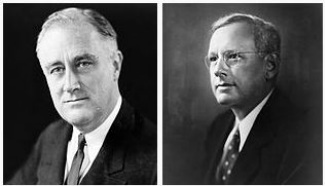 A sampling error led to an embarrasing and wrong prediction. A sampling error led to an embarrasing and wrong prediction. Tags: methodology/statistics, politics/election/voting, quantitative methodology, sampling bias, sampling frame, straw poll, survey research, 00 to 05 mins Year: 1989 Length: 1:03 Access: YouTube Summary: A fundamental part of survey research is collecting a representative sample. This video illustrates the importance of this by showing how a biased sampling procedure led to a huge prediction error in the 1936 presidential election between Franklin D. Roosevelt and Alf Landon. Even though one sample size was enormous (more than 2.3 million respondents), it could not fix a fundamentally flawed sampling procedure, and incorrectly predicted that Landon would win the election. The sampling frame (the list of people from whom the sample was chosen) was built from lists of automobile and telephone numbers, which many low and middle income voters could not afford in the 1930's. Therefore, its sample reflected people with higher class backgrounds and "missed the larger pro-Roosevelt sentiment among low-income voters." In short, it did not reflect the population, leading to a very embarrassing and fatal error for the polling company (especially since Roosevelt won with 62% of the vote). This is also known as a straw poll, or a poll used to gauge political opinions that is conducted poorly or without utilizing proper sampling methods. At the same time, Gallup conducted a poll and correctly predicted the winner, based on a fraction of the sample size (50,000 respondents). Note this clip is from Program 14 of the Against All Odds series, and even more can be found here under the tab "Select a Video Unit." Submitted By: Bhoomi K. Thakore |
Tags
All
.
Got any videos?
Are you finding useful videos for your classes? Do you have good videos you use in your own classes? Please consider submitting your videos here and helping us build our database!
|
 RSS Feed
RSS Feed
